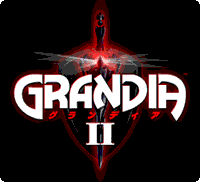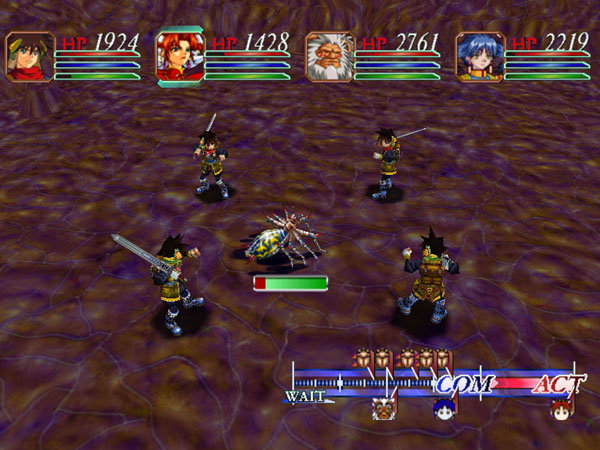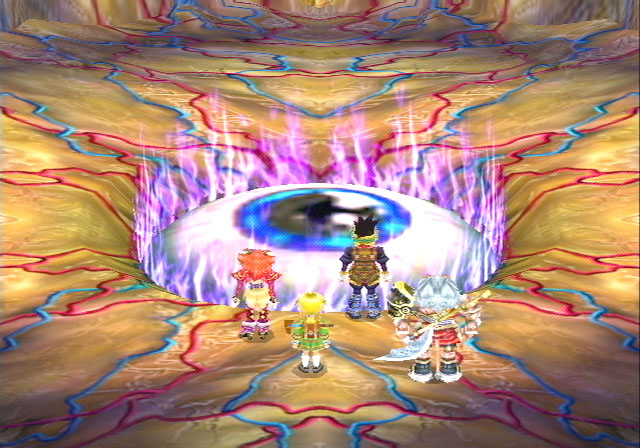|
|

|
BATTLE SYSTEM
|

|
INTERACTION
|

|
ORIGINALITY
|

|
STORY
|

|
MUSIC & SOUND
|

|
VISUALS
|

|
CHALLENGE
|
Easy to Medium
|
COMPLETION TIME
|
20-30 Hours
|
|
OVERALL
3.0/5
|
Rating definitions
|
|
|
An arrogant Geohound named Ryudo performs random jobs for a living, until a request from a priestess named Elena takes him across the world, where he and other allies ultimately come into conflict with an ancient evil named Valmar. Grandia II for the Playstation 2, like its predecessor, features a solid combat system, although like its predecessor, unfortunately, it suffers from sloppy porting issues, yet ends up being a better package overall.
As with the first game, enemies wander around dungeons, with the player coming into contact with them to begin a battle. The player's party can take an enemy party by surprise if they're not glowing red, although enemies, too, can take the player's party by surprise if they contact one of Ryudo's allies on the field. The encounter system isn't as problematic as it was in the first game, although again, level makes no difference as to whether or not foes charge your party on the field.
Luckily, though, battles are just as solid as they were in the first game in spite of some minor changes. Again, combat combines turn-based and real-time elements, with all characters and enemies appearing on a turn gauge, and your party able to input a variety of moves such as two types of attacks, combination attacks that hit enemies normally more than once and critical attacks that can cancel enemy moves when timed right, magic, special moves, and so forth.
 Attack of the clones
Attack of the clones
|
|
Each character can equip a Mana Egg allowing him or her to use magic as well as a certain number of innate skills from Skill Books granting bonuses such as increased HP. Points gained from battle alongside money and experience allow players to power up magic, special moves, and innate abilities. It's a pretty solid battle system overall, with most fights being decently-paced, with only a few minor shortcomings such as the somewhat poorly implemented and seemingly random field movement as well as one or two frustrating points of no return, but otherwise, battles are fun.
The interface is clean for the most part, even if the ring menus take a bit of getting used to and managing skills from Books can be slightly problematic, although in many instances during field movement, the game experiences a bit of slowdown, making dungeon and town treks seem to take longer than necessary. Luckily, though, the compass is more useful than in the first game, actually saying whether it's pointing forward through a dungeon or back to the entrance, and even helps point out shops and inns in towns. Automaps, though, might've been handy in the often complicated dungeons, but otherwise, interaction is tolerable.
Grandia II retains enough features from its predecessor to make it feel like a logical part of the series, such as the general setup of battles, but introduces some new elements like Skill Books and revamped Mana Eggs to help it feel unique in its own right.
The story, thankfully, isn't nearly as infantile as the first game's, although it is somewhat hurt by its resemblance to the plot of Lunar 2. It generally reflects a stereotypical struggle between good and evil (the ancient war of the game's backstory is even called the Battle of Good and Evil). Even Ryudo pokes fun at the war's name during the game, with his wittiness being a decent redeemer in the plot. There is a bit of backstory to some of the characters, although some questions are left unanswered, and fetch quests do throw the plot off at times. Even so, the plot is probably the strongest of the series, from this reviewer's experience.
 A giant gets buried alive
A giant gets buried alive
|
|
Noriyuki Iwadare composes the sequel's soundtrack, which surprisingly hits more than misses, with some decent tracks, although there are still some issues, such as the fact that during most cutscenes, even those without voice acting, there is no music at all, and some tunes are fairly subdued as well. The voicework itself is a definite step above the first game's, though it does sound somewhat stilted at times. There are, moreover, some minor audio glitches with battle voice clips. Still, the aurals are tolerable overall, despite the inconsistent presentation of the music and minor sound glitches.
The visuals, though, suffer the most from the port from the Dreamcast. During many instances when there's more than one character sprite on the screen, the game experiences a lot of slowdown and choppiness, though mercifully, there aren't any freezes like in the first game. The graphics themselves, though, are fairly dated, with the character sprites looking like mouthless dolls, and many of the environments look bland and dull-colored. The monster designs in battle are actually pretty decent, though. Finally, the FMVs throughout the game are fairly grainy and choppy as well. All in all, the graphics are hardly a reason to purchase the game.
Finally, Grandia II is much shorter than its predecessor, taking somewhere from twenty to thirty hours to complete, with few sidequests of which to speak. Overall, Grandia II is a fairly decent sequel that unfortunately suffers from porting issues on the Playstation 2, with its battle system being enjoyable but most other aspects being average as a result. If you still have a Dreamcast lying around, you might want to pick up that version instead.
Review Archives
|









